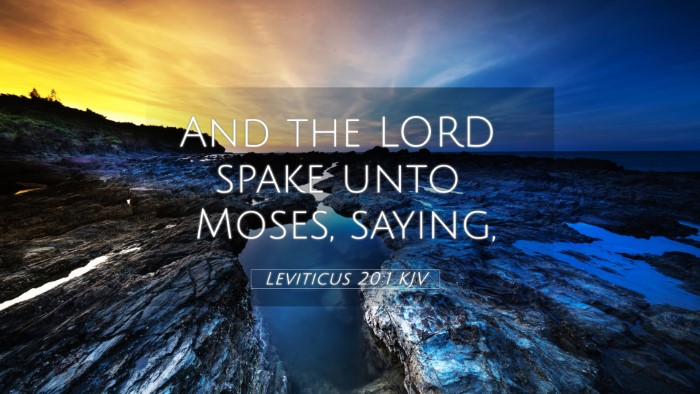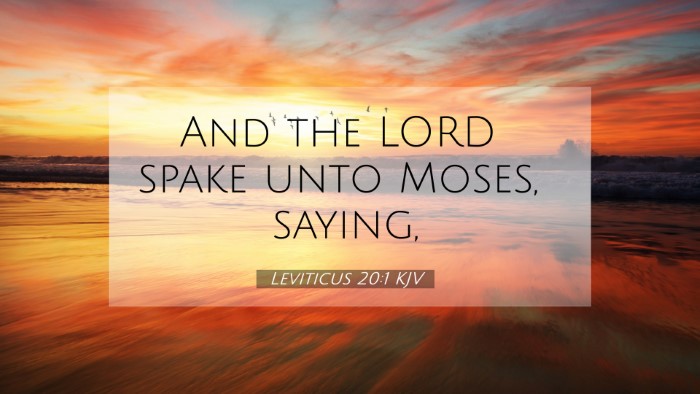Understanding Leviticus 20:1
Leviticus 20:1: "And the LORD spake unto Moses, saying,"
Context Overview: The book of Leviticus details the laws and regulations set forth for the children of Israel, focusing on holiness and community conduct. Leviticus 20 specifically addresses moral conduct and the penalties for various sins within the Israelite community.
Meaning and Insights
This verse serves as an introduction to a section where God communicates moral and civil regulations necessary for the well-being of His people. Public domain commentaries provide various insights into this verse:
- Matthew Henry: He emphasizes God's authority in providing laws and emphasizes that His words remind the Israelites of their unique covenant relationship with Him. The divine speech marks the seriousness of the laws that follow.
- Albert Barnes: Barnes points out the transition into a series of penalties for specific abominations, noting that this guidance is provided to maintain purity within the community. The LORD's direct communication signifies the importance of obedience to His commandments.
- Adam Clarke: Clarke remarks on the implications of God speaking directly to Moses, highlighting the priestly role of Moses in conveying these laws to the people. God’s instructions are not arbitrary but are meant to guide the people toward holiness.
Bible Verse Cross-References
Leviticus 20:1 can be understood and appreciated more fully through several key cross-references:
- Exodus 19:5-6: God reminds the Israelites of their status as a treasured possession and a holy nation.
- Leviticus 18:1-5: Contextual backdrop discussing moral and ethical conduct expected of the people.
- Deuteronomy 18:18: God promises to raise a Prophet like Moses, emphasizing the importance of listening to God’s chosen servants.
- 1 Peter 1:16: Quoting Leviticus, this New Testament reference reinforces the call to holiness.
- Romans 12:1: Paul urges believers to present their bodies as a living sacrifice, reflecting the essence of Levitical holiness.
- Hebrews 12:14: This verse highlights the importance of striving for peace and holiness, resonating with the moral imperatives given in Leviticus.
- Matthew 5:17-20: Jesus mentions the Law, connecting it to His teachings and emphasizing fulfillment rather than abolishment.
Connections Between Bible Verses
Exploring the thematic connections and links between these scriptures can enrich one’s understanding of Leviticus 20:1:
- Thematic Link: The recurring theme of holiness and separation from sin emphasizes the necessity of obeying God’s commands.
- Cross-Referencing Biblical Texts: Understanding how Leviticus laws relate to New Testament teachings helps draw parallels in the moral expectations across covenants.
- Inter-Biblical Dialogue: The conversation between Old Testament and New Testament texts regarding law and grace elucidates the continuity of God's moral order.
Tools for Bible Cross-Referencing
To study Leviticus 20:1 and its implications further, several tools and methods can be utilized:
- Bible Concordance: Use concordances to locate related scripture passages.
- Bible Cross-Reference Guide: Guides can provide thematic categories that connect various Bible verses.
- Cross-Reference Bible Study: Methods that explore the interconnections between passages can deepen understanding.
- Comprehensive Bible Cross-Reference Materials: Use resources compiled by scholars to learn in-depth about various themes and laws.
Long-Tail and User Intent Keywords
Utilizing specific long-tail and user intent keywords can aid in deeper studies regarding Leviticus 20:1:
- Identify connections between Old and New Testament: Examine how this verse correlates with the New Testament's approach to the law.
- Detailed cross-reference between Gospels: Analyze how Gospel writers reflect on the laws presented in Leviticus.
- Find cross-references for Leviticus 20:1: Seek related verses that correlate moral implications within the broader biblical context.
Conclusion
Leviticus 20:1 serves as a significant starting point for understanding God's expectations for His people. By studying this verse in conjunction with relevant cross-references and commentaries, one can appreciate the depth of biblical law and its application across time. This approach enhances the journey of scriptural cross-referencing and reveals the intricate connections within Scripture that guide personal faith and community ethics.


